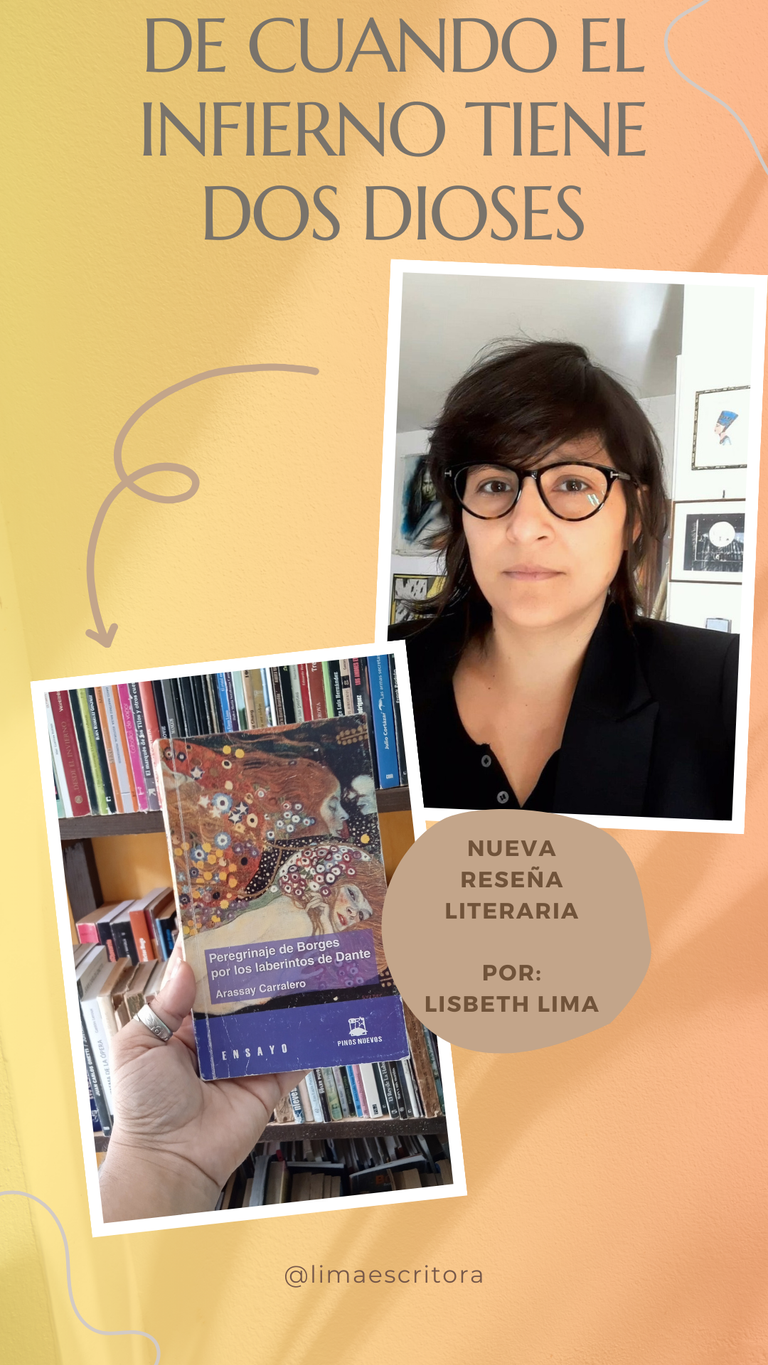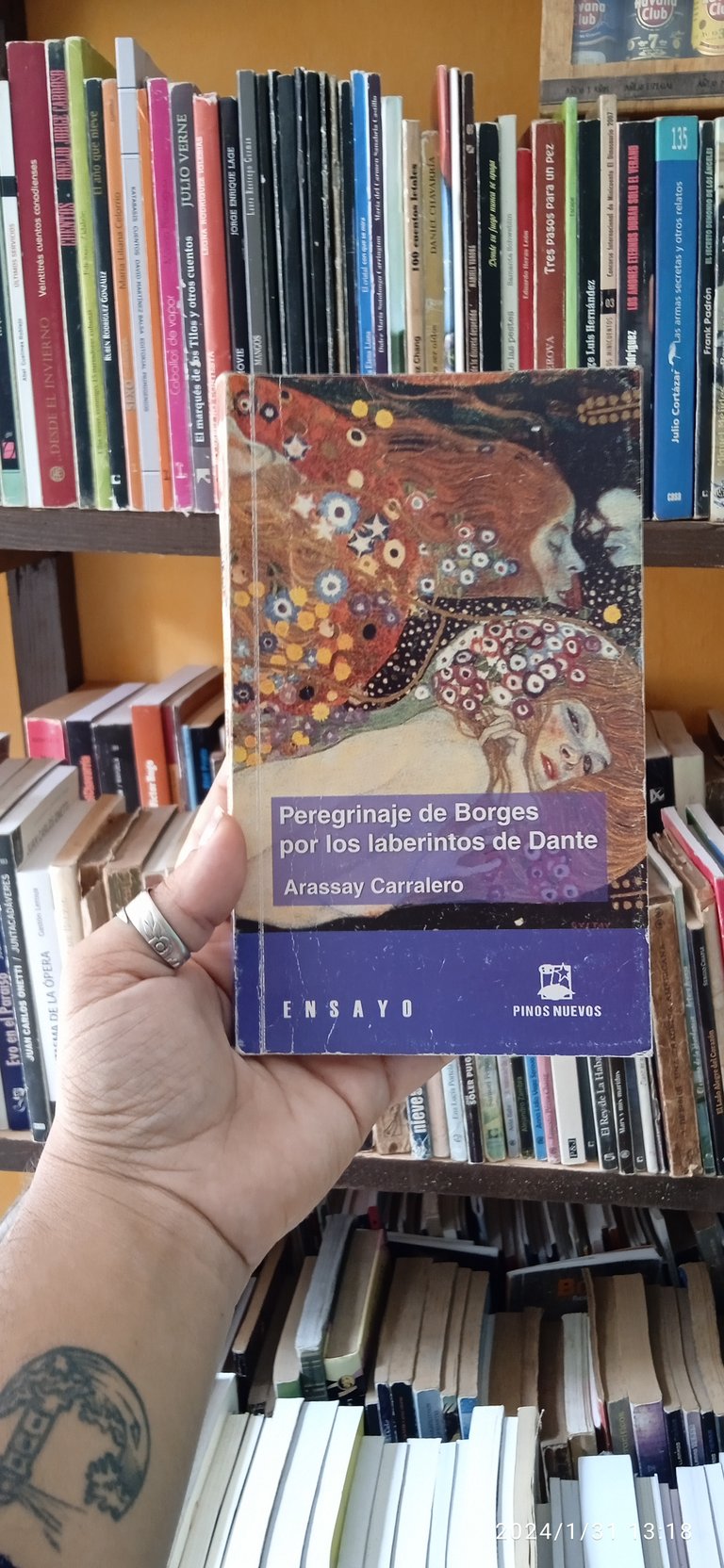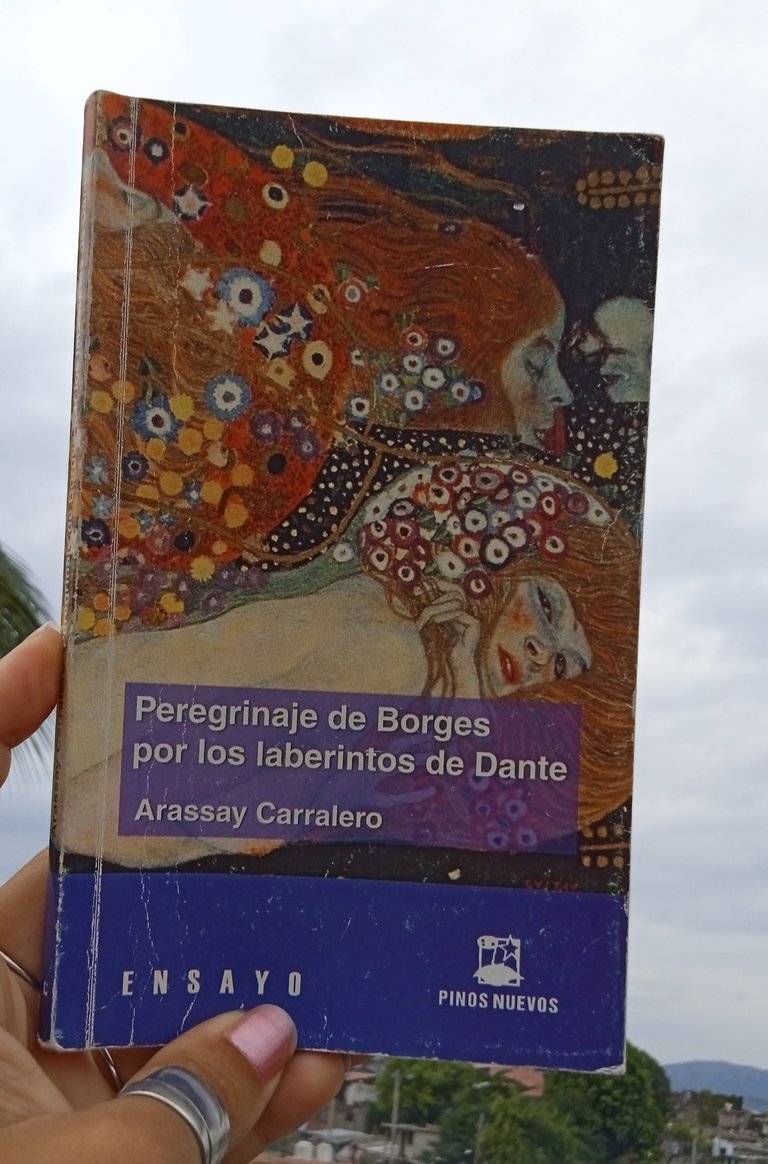
Reseña literaria al libro: Peregrinaje de Borges por los laberintos de Dante
Literary review of the book: Borges' Pilgrimage through Dante's Labyrinths
De todos los instrumentos del hombre,
el más asombroso es, sin dudas, el libro.
Los demás son extensiones de su cuerpo.
El microscopio, el telescopio, son extensiones
de su vista; el teléfono, es extensión de la voz;
luego tenemosel arado y la espada,
extensiones del brazo. Pero el libro es otra cosa:
es una extensión de la memoria y la imaginación
Jorge Luis Borges
Of all the instruments of man,
the most amazing is, without a doubt, the book.
The others are extensions of your body.
The microscope, the telescope, are extensions
of his sight; the telephone is an extension of the voice;
then we have the plow and the sword,
arm extensions. But the book is something else:
It is an extension of memory and imagination
Jorge Luis Borges
Si alguien me hubiese dicho que encontraría este libro, justo en ese momento en el que analizaba ¿qué podía presentar en el evento por el 700 aniversario de la muerte de Dante Alighieri, y la influencia de la cultura italiana en Cuba?, la verdad, no me lo hubiese creído. El azar, tal vez, haciendo de las suyas, o el karma, tras haberme encontrado esa mañana con la organizadora del espacio, y retribuir con ideas para la organización del mismo… no sé. Quizá fue cosa de energía y lo atraje mientras pensaba en Dante, en la gracia de su nombre, la armonía indisoluble de su obra. Lo cierto es, señores, que en el peregrinar por toda Enramadas, llegarme hasta la Librería Manolito del Toro, fue un golpe de suerte. Y son estos los libros con los que realmente establezco un vínculo más allá del habitual, esos libros “sorpresa”, que traen consigo el misterio de su llegada. Pero si además de esa magia, resulta que te topas con el equilibrio perfecto entre goce y conocimiento, pues, ahí sí ya, reconócete bendecido.
If someone had told me that I would find this book, right at that moment when I was analyzing what I could present at the event for the 700th anniversary of the death of Dante Alighieri, and the influence of Italian culture in Cuba?, the truth is, I wouldn't have believed it. Chance, perhaps, doing its thing, or karma, after having met the organizer of the space that morning, and giving back with ideas for its organization... I don't know. Maybe it was a matter of energy and I attracted him while I was thinking about Dante, about the grace of his name, the indissoluble harmony of his work. The truth is, gentlemen, that in my pilgrimage throughout Enramadas, reaching the Manolito del Toro Bookstore was a stroke of luck. And these are the books with which I really establish a bond beyond the usual one, those “surprise” books, which bring with them the mystery of their arrival. But if, in addition to that magic, it turns out that you find the perfect balance between enjoyment and knowledge, well, there you go, consider yourself blessed.

Tal como estoy segura se sentirá usted, lector, cuando avance entre los recovecos de este ensayo, en el que no basta la presencia de Dante, sino que además, Borges y su literatura lo protagonizan, siendo Alighieri ese túnel por donde se desplace, transformando las palabras tal cual trozo de nube. Peregrinaje de Borges por los laberintos de Dante, de la autora Arassay Carralero, premio Pinos Nuevos de ensayo, 2016, publicado por Letras Cubanas, es esa cita con lo inolvidable en la obra de un autor.
Just as I am sure you, the reader, will feel when you advance through the recesses of this essay, in which the presence of Dante is not enough, but in addition, Borges and his literature star in it, Alighieri being that tunnel through which you move, transforming the words just like a piece of cloud. Borges' Pilgrimage through Dante's Labyrinths, by the author Arassay Carralero, Pinos Nuevos essay award, 2016, published by Letras Cubanas, is that appointment with the unforgettable in the work of an author.

Arassay carralero, autora del libro Peregrinaje de Borges por los laberintos de Dante
Arassay Carralero, author of the book Borges' Pilgrimage through Dante's Labyrinths
La presencia de la obra de Dante Alighieri en las creaciones de Borges se puede constatar desde textos muy tempranos del autor. No solo es reiterada a lo largo de su quehacer intelectual, sino que se va fortaleciendo hasta cobrar la dimensión de uno de los laberintos por los que mejor adentrarse en los modos de asumir su ficción, y en su particular mirada sobre nociones claves como canon literario. Alusiones, citas, comentarios, paralelismos ficcionales, críticas a los estudios dantescos… dan fe de un diálogo modélico de un gran escritor con sus mentores. (Nota de contracubierta)
The presence of Dante Alighieri's work in Borges' creations can be seen from very early texts by the author. Not only is it reiterated throughout his intellectual work, but it becomes stronger until it takes on the dimension of one of the labyrinths through which it is best to delve into the ways of assuming his fiction, and in his particular look at key notions as a literary canon. . Allusions, quotes, comments, fictional parallels, criticisms of Dantesque studies... attest to an exemplary dialogue between a great writer and his mentors. (Back cover note)

Todo en Dante, desde la fecha de su nacimiento, hasta los recovecos de su creación, tiene ese sabor enigmático, y Borges también hace alarde ante tal condición en su obra. No sé si para ustedes saber si Durante o Dante, llamado así hipocorísticamente, sea algo que despierte una curiosidad arrolladora, o si la alusión a su posible signo: Géminis, lo cual estrecha el rango en la fecha de su alumbramiento, o las conclusiones a las que los estudiosos de su vida han podido llegar solo tras el escudriño de su obra, signifique, como para mí, esa suerte de dato escondido que alimenta el interés en este “poeta supremo”, como se le clasificara, pieza indispensable en el trance del pensamiento medieval al renacentista con la Divina comedia, cumbre de la literatura universal. Tal vez Borges, se sintiera presa, además de por su verbo, también por la historia que encierra la figura de este italiano, cuyo nombre nunca escapa a la referencia.
Everything in Dante, from the date of his birth, to the recesses of his creation, has that enigmatic flavor, and Borges also flaunts this condition in his work. I don't know if it's for you to know if Durante or Dante, so called hypochoristically, is something that arouses overwhelming curiosity, or if the allusion to his possible sign: Gemini, which narrows the range in the date of his birth, or the conclusions to which the scholars of his life have been able to arrive at only after scrutinizing his work, mean, as for me, that kind of hidden data that fuels interest in this “supreme poet”, as he was classified, an indispensable piece in the trance from medieval to Renaissance thought with the Divine Comedy, the summit of universal literature. Perhaps Borges felt imprisoned, in addition to his verb, also by the history contained in the figure of this Italian, whose name never escapes reference.
Ya por los años treinta del siglo pasado, Borges comenzaba los esbozos dantescos en su obra, pero no fue hasta la segunda mitad cuando realmente se consolidó el vínculo entre ambos escritores, arraigándose al universo cultural del poeta. Su decir sobre la obra del toscano adquiere una magnitud tal, que las afirmaciones hechas por él, la de los comentaristas, las de otros estudiosos, se entrecruzan y van instaurando un saber alrededor del texto dantesco hasta tal punto que podríamos afirmar que resulta otro de sus laberintos. (Fragmento del libro, pág.10)
Already in the 1930s, Borges began Dantesque sketches in his work, but it was not until the second half when the bond between both writers was truly consolidated, taking root in the poet's cultural universe. His words about the Tuscan's work acquire such a magnitude that the statements made by him, those of the commentators, and those of other scholars, intersect and establish knowledge around the Dantean text to such an extent that we could affirm that it is another of its labyrinths. (Fragment of the book, page 10)
(…) Leí muchas veces la Comedia, afirma, en distintas ediciones, y pude gozar de los comentaristas de todas ellas, dos me reservo particularmente: la de Momigliano y la de Grabher. Recuerdo también la de Hugo Steiner. Leí todas las ediciones que encontraba y me distraía con los distintos comentarios, las distintas interpretaciones de esa obra múltiple. Comprobé que en las ediciones más antiguas predomina el comentario teológico, en las del siglo XIX, el histórico, y actualmente el estético. (Jorge Luis Borges: “Siete Noches”, Obras completas, 1975-1985, pág. 209)
(…) I read the Comedy many times, he says, in different editions, and I was able to enjoy the commentators of all of them, two I particularly reserve: that of Momigliano and that of Grabher. I also remember Hugo Steiner's. I read all the editions I could find and was distracted by the different comments, the different interpretations of this multiple work. I verified that in the oldest editions theological commentary predominates, in those from the 19th century, the historical one, and currently the aesthetic one. (Jorge Luis Borges: “Siete Noches”, Complete Works, 1975-1985, page 209)

Como si no hubiese opción al escape, página a página la necesidad que se instala es tal, que imposible no continuar siguiéndole la pista a Borges por los episodios dantescos que engalanaron su obra. Realmente había de sentir una pasión tremenda, lo delata el estudio incansable de todos los trabajos que hicieran alusión al poeta Alighieri, seguro de que cada una de ellas lo haría aproximarse más a la verdad, a las disímiles lecturas que ofrece. Es apreciable, además, la recurrencia a Ulises, personaje de Inferno, quien será pilar en no pocos de sus ensayos. Comprendemos entonces, la eficacia de sus métodos, tal vez, o la importancia de sus estudios interpretativos a la obra de este autor italiano que revolucionó desde siempre, como tantos otros que se le sucedieron.
As if there were no option to escape, page by page the need that is established is such that it is impossible not to continue following Borges' trail through the Dantesque episodes that adorned his work. He really had to feel a tremendous passion, which is revealed by his tireless study of all the works that allude to the poet Alighieri, certain that each one of them would make him come closer to the truth, to the dissimilar readings he offers. Furthermore, the recurrence to Ulysses, a character from Inferno, who will be a pillar in many of his essays, is noticeable. We understand then, the effectiveness of his methods, perhaps, or the importance of his interpretative studies to the work of this Italian author who has always revolutionized, like so many others who followed him.
Se utiliza en el libro recursos borgeanos, estrategias discursivas, puntos apreciativos sobre la obra de Dante, que permiten al lector disfrutar cognitivamente los modos de hacer de dos grandes escritores a la vez, encerrados en esa dicotomía antiguo - contemporáneo. Las confrontaciones que establece Borges respecto a los comentarios de autores diversos en cuanto a lo dantesco, resultan realmente interesantes y hasta retroalimentan al obligarnos al ejercicio de nosotros también poner los criterios en tela de juicio y replanteárnoslo, ahora, una vez descubierto el suyo.
No temas, te exhorto a que en confianza te dejes caer en este pozo donde el conocimiento será la única profundidad que te cubra. Son páginas para entender lo que no te fue posible antes, en el Inferno.
The book uses Borgesian resources, discursive strategies, appreciative points about Dante's work, which allow the reader to cognitively enjoy the ways of doing things of two great writers at the same time, locked in that ancient - contemporary dichotomy. The confrontations that Borges establishes regarding the comments of various authors regarding the Dantesque, are really interesting and even provide feedback by forcing us to exercise our criteria and question them and rethink them, now, once his own has been discovered.
Do not be afraid, I urge you to confidently let yourself fall into this well where knowledge will be the only depth that covers you. They are pages to understand what was not possible before, in Inferno.
Todas las imágenes utilizadas en el post son de mi propiedad.
All images used in the post are my property.

https://inleo.io/threads/yecier/re-yecier-2ex6wvecy
The rewards earned on this comment will go directly to the people ( yecier ) sharing the post on LeoThreads,LikeTu,dBuzz.
Cuando sacas una reseña de un libro sé que lo puedo leer sin susto que me va a gustar o enseñar algo nuevo. 💪
Gracias por leer, siempre, y por la ayuda con la promoción. Reseñar me apasiona.
Síguelo haciendo ❤️ me encanta leerte.
Muy buena presentación de este libro (no conocido) que, sin duda, nos ofrece un acercamiento a la visión borgeana del Dante (uno de sus queridos autores), que, por tu reseña, recoge un trabajo investigativo e interpretativo de gran calidad. Saludos, @limaescritora.
Muchísimas gracias por leer y por su comentario. El libro es conocido en el gremio literario cubano, lástima que no haya traspasado las fronteras, pues, es un buen ensayo con una mirada fresca sobre lo Borgeano y Dantesco.
Me encanta la manera en que escribes, me deja atrapada entre líneas.
Dante ha tenido influencia en muchísimos autores y cómo no, si fue uno de los grandes
Gracias, amiga, por leer y por tus palabras. Escribo desde donde único se puede escribir para hacerlo genuino: el alma, así que me reconforta el saber que te llegan de tal modo mis letras.
Saludos desde Cuba.
Esta publicación ha recibido el voto de Literatos, la comunidad de literatura en español en Hive y ha sido compartido en el blog de nuestra cuenta.
¿Quieres contribuir a engrandecer este proyecto? ¡Haz clic aquí y entérate cómo!